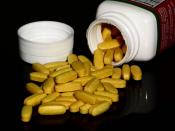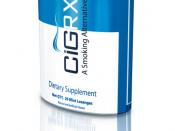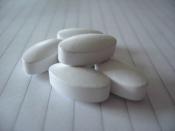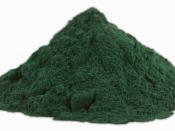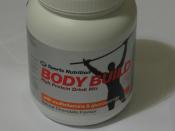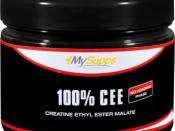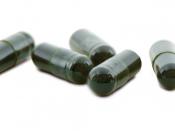Supplements: Gain the Edge or Fall Behind? Living in such a competitive world as we do, people are always searching and trying new ways to become bigger, faster, stronger and to improve their over all athletic performance. People spend billions of dollars a year on supplements in hopes that they will aid in their efforts to build muscle mass and increase their power. The supplement industry continues to grow with little regulations from the FDA (Food and Drug Administration). Surveys indicate that approximately 50% of the general population, 76% of college athletes, and 100% of body builders take supplements. New products appear on the market every week. You can obtain dietary supplements through many sources, including health food stores, grocery stores, pharmacies and by mail. Dietary supplements come in many forms including tablets, capsules, powders, gel tabs, extracts, liquids, etc. One provision of the DSHEA (Dietary Supplement Health and Education Act) defines dietary supplements as: 1.
Dietary supplement means a product (other than tobacco) intended to supplement the diet that bears or contains one or more of the following dietary ingredients: ⢠A vitamin ⢠A mineral ⢠An herb or other botanical ⢠An amino acid ⢠A dietary substance for use by man to supplement the diet by increasing the total dietary intake; or ⢠A concentrate, metabolite, constituent, extract, or combination of any ingredient described above.
2. Dietary supplement means a product that: ⢠Is intended for ingestion ⢠Is not represented for use as a conventional or as a sole item of a meal or the diet and ⢠Is labeled as a dietary supplement 3. A dietary supplement does: ⢠Include an article that is approved as a new drug, certified as an antibiotic, or licensed as a biologic and was certified or licensed or marketed as a dietary supplement.
Athletes are always looking for ways to improve their performance, so it's no surprise that supplements are very popular. Supplement claims are in magazines, television, and internet sites everyday. With all these sources of information, it's hard to separate fact from fiction. Unfortunately, supplement companies do not have to fully prove that their supplement works or if it's even safe before selling to the public. It is important to know what the supplement companies can and can't put on their labels. From personnel experiences of the top athletes around the world, here is a background of what's considered to be the best three supplements that anyone at any fitness level can use to enhance workouts, help burn fat, boost energy and stay healthier.
Creatine Creatine is the latest headline-grabbing substance said to help boost athletic performance. Everyone agrees that for increasing muscle mass, Creatine is the most effective legal sports supplement ever. According to experts, Creatine supplements give you the ability to work out longer and harder. Some estimate that 75% of the Denver Broncos and 60% of all major league baseball players use Creatine. Bodybuilders around the world are making use of the most effective sports supplement with no proven negative side effects. From the battle fields of high school athletics to the wars of professional ball, Creatine is much involved.
Creatine is a naturally occurring substance that exists in every muscle of your body. Whenever you use your muscles, a chemical (adenosine tri-phosphate-ATP) is broken down into two simpler chemicals (adenosine di-phosphate-ADP and inorganic phosphate). This process of ATP turning into ADP releases the energy which gives you power. The problem is that your muscles only contain enough adenosine tri-phosphate to last about 10-15 seconds at maximum exertion. The ADP can not be used to create more energy for our muscles. However, with the help of Creatine and phosphates- ADP can be converted back into the very useful ATP. Creatine Monohydrate combines with abundant phosphorus stored in the muscles and is converted into Creatine Phosphate. The Creatine Phosphate is then able to restore the adenosine di-phosphate into adenosine tri-phosphate, by giving up a phosphate molecule. Now, instead of just ADP, your body has more ATP. More ATP in your body basically means more fuel for your muscles. This allows you to keep pumping.
The average human muscle contains between 3.5 and 4 grams of Creatine per kilogram of muscle. Once the Creatine is used up, so are you. You then have to rest your muscles and wait a while before your next set of repetitions. The good news is that your body can store up to 5 grams of Creatine per kilogram. In other words, if you are not taking Creatine supplements to get the full 5 grams of Creatine in your muscles - up to 30% of your body's Creatine capacity is not being used.
According to every known study, the answer is that Creatine is safe. It is not a steroid. It is a natural substance that already exists in your body. Many though, abuse Creatine. Creatine should always be taken within the recommended dosages. Exceeding the recommended dosages could indeed lead to problems ranging from muscle cramps to dehydration. In addition, there are no proven benefits to exceeding the recommended dosage, so the solution is simple - enough is enough.
Creatine will only work effectively if taken with a balanced, nutritional diet. Muscle mass is increased because you are able to work out longer and harder, but you should expect the changes to be gradual and steady.
Protein Supplements Protein is getting world wide attention these days and becoming more and more popular in the athletic world. Because muscles are composed of protein, athletes believe that eating more protein will translate into more muscle. And to a large extent, more protein works: steadier energy levels, less body fat, stronger immunity, and better work out results. Some studies show that the typical American diet provides more than the recommended 15% of calories from protein- more than enough to aid muscle integrity. Others show that the more the better. Safe amounts of protein are 0.8 - 2.0 g/kg body weight. Large amounts of protein may cause dehydration, causing performance to decline. Excess protein will be stored as fat. But it's difficult to get enough quality protein these days. If getting the recommended amount of protein per day is trouble for you, protein supplements may help, but nothing replaces or beats a steady diet.
Caffeine Yes, caffeine. Properly used, caffeine increases the use of body fat by up to 100%, and boosts endurance up to 60%. Affordable and readily available in coffee or tea, caffeine seems to be among the few ergogenic aids that have been shown to work in a number of scientific studies. The caffeine equivalent of two cups of coffee ingested before exercise increases endurance in both well trained athletes and weekend athletes. The theory is that caffeine stimulates the breakdown of fats for energy, which slows the depletion of glycogen, the main energy stores of the body. Caffeine doesn't seem to improve performance during conditions of high athletic skills and it can have harmful side effects. Caffeine in large amounts, over time, will wear out your adrenal system leading to long term fatigue. It is a diuretic, so stay on top of your hydration during caffeine use.
If you decide to take a supplement there are many ways to go about evaluating its safety and efficacy. You should always ask a health care professional who is knowledgeable about nutrition and supplements. Do a literature search, being cautious of publications or articles funded by the manufacturer of the supplement. Take into consideration how long the company has been in business. Is their research published? Do they have quality control standards? Be aware of any illegal or banned substances contained within the supplement. Note any side effects associated with the supplement. Take into consideration the side effects the supplement can cause because of any medications or other supplements you may be taking. Don't buy into any hype. Be skeptical of promises made by nutritional supplement companies and learn which supplements work for your body and stick with them. It's important to use supplements only as an adjunct to healthy eating and intelligent exercise.
Works Cited Cleveland Clinic. "Nutritional Supplements for the Athlete" www.clevelandclinic.org/health/health-info Harr, Eric. "Will they pump you up?" www.ericharr.com/nutritional_supplements (Nov. 2002).
Intelihealth. "Sports Enhancers: The Good, The Questionable And The Dangerous" www.intelihealth.com (04 Nov. 2002) McKinley Health Center. "Ergogenic Aids: Supplements for Athletes" www.mckinley.uiuc.edu/handouts/ergogenicaids Office of Dietary Supplements. "What Are Dietary Supplements" www.ods.od.nih.gov/whatare/whatare. (11 May.2001) Power Supplements. "Creatine" www.powersupplements.com/creatine.
U.S. Food And Drug Administration. "Overview of Dietary Supplements" www.cfsan.fda.gov/~dms?ds-oveiw
